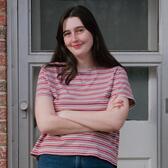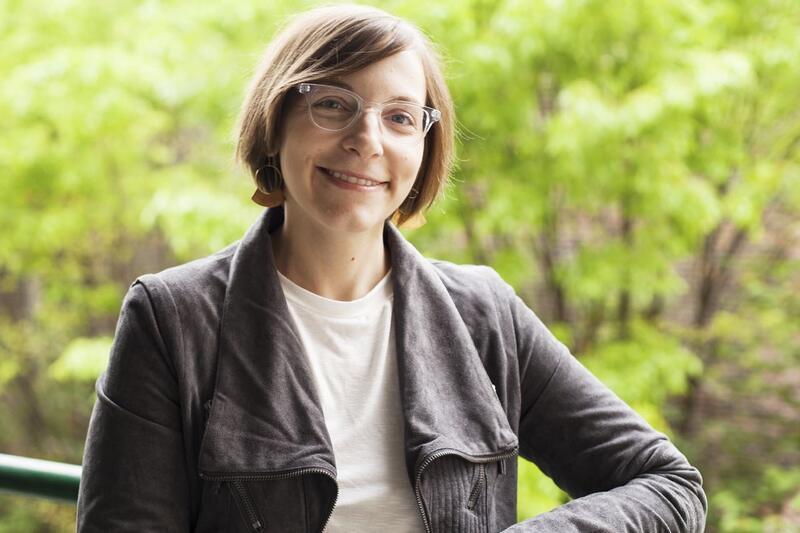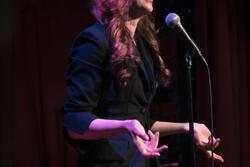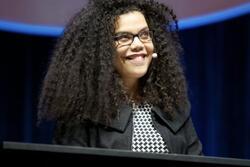7 Questions For Anna Ziegler
JWA chats with playwright Anna Ziegler, whose play The Wanderers, about two Jewish couples, recently finished a successful run at the Roundabout Theatre in New York City.
JWA: In The Wanderers, each character has a unique and sometimes tense relationship with books and storytelling. What was a book or piece of literature that came into your life at the right moment?
Anna Ziegler: I think I emerged from the isolation of the pandemic more intact than I would have had I not been reading the Harry Potter series to my young son for the better part of those years. It was the perfect escape—and also (I know it’s cliché) it was just incredibly powerful to see those books through his eyes. We have a joke in our house about experiences that elicit “pure joy” (we’re all terrible cynics apparently), but in this case it was true—that series brought my son pure joy, and much vicarious joy to me, too.
JWA: Especially in light of the recent antisemitic demonstration at the Broadway show Parade, what does it mean to you to have The Wanderers onstage at this moment?
AZ: I think it’s always important to tell Jewish stories, and right now even more so. And there seems to be a particular hunger for Jewish stories at the moment, as evidenced by ticket sales to Parade and Leopoldstadt and my play, too. It’s also particularly gratifying to put on a Jewish play in a city whose theatergoers are largely members of the tribe! They get all the jokes.
JWA: What, in your opinion, makes a piece of art a Jewish one? Is it as simple as the artist behind it being Jewish or it is something more?
AZ: I haven’t really thought about this before, but my impulse is that a Jewish artist doesn’t necessarily make “Jewish” art. To be considered Jewish, I’d think that the art would need to engage with Judaism in some way—or at least involve characters interrupting each other all the time and eating Chinese food on Christmas.
JWA: You’ve written plays about everything from the Hasidic community in The Wanderers, to the life of scientist Rosalind Franklin in Photograph 51, to Muslim-Jewish relationships in Dov and Ali, to the challenges of romantic relationships in Actually and A Delicate Ship—and you have still more plays that I didn’t even mention. Is there a common factor that connects the stories you are interested in telling?
AZ: If there is one, it might have to do with forgiveness. Self-forgiveness. Forgiveness of others. My characters are often struggling to move forward in their lives or to reckon with past actions, which means there’s an element of atonement that snakes its way through my plays.
JWA: You also studied poetry in graduate school. How does poetry inform your playwriting, and vice versa?
AZ: I don’t write much poetry anymore— instead I put it in my plays. So in that sense, I think poetry informs my work a great deal. My poetry was also always quite narrative and filled with dialogue—so I think I’ve just stopped writing poems that were plays in favor of writing plays that are poems.
JWA: What drives your need to write?
AZ: The desire to write a better play! To fail better. To fulfill my potential? To get parental approval! To have something to do with my days. To have something to complain about?
JWA: And lastly, is there a tradition, in the religious or secular, casual or formal sense, that has been bringing you joy lately?
AZ: I wish I had more traditions in my life. I have a yen to start keeping Shabbat, at least in the sense of my family eating dinner together, without our iPads on the table. In terms of ritual (which is connected, right?), I really enjoy my kids’ bedtime ritual. Most nights, after reading a bit, my kids and I get in bed and do the Wordle. Then we chat a little about their days—it’s the only time they’re willing to talk to me, because there’s nothing else they can do to prolong the day (no more watching YouTubers explain their Minecraft tricks or FaceTimes with their cousins—FaceTimes during which they play Minecraft or watch people on YouTube talk about Minecraft). They’re just stuck with me! Which suits me just fine.








I loved The Wanderers at Lantern Theater in Philadelphia, yesterday! I loved the way so may of the characters' self statements ended with "I don't know".
The booklet Lantern created doesn't show your photo or any sekf-statenent which is why I've been reading, now 3 interviews of you.
I want to write a play about Emma Lazarus...but...I'm working as a psychoanalyst...and writing drashes for my shrinking Jewish Renewal group. Your play, a copy of which I just ordered, may help me. [I also have an MA in Eng Lit and experience with theater in Detroit, growing up.]
Have you seen the Lantern Theater production. OR will you be coming?